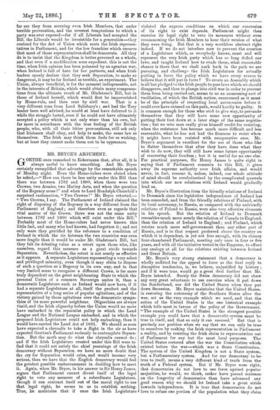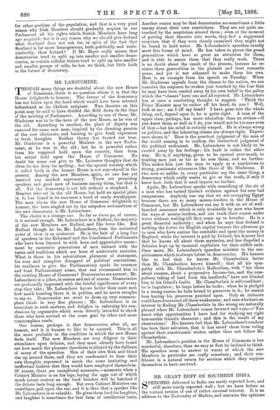MR. BRYCE'S ARGUMENT.
GOETHE once remarked to Eckermann that, after all, it is always useful to know something. And Mr. Bryce certainly exemplified that advantage by the remarkable speech of Monday night. Even the Home-rulers were elated when he asked,—" How can there be less unity under this Bill than there was between 1782 and 1800, when there were two Crowns, two Armies, two Mutiny Acts, and when the question of the Regency arose ?" and when to Lord Randolph Churchill's surprised exclamation, "Two Crowns!" Mr. Bryce retorted,— " Two Crowns, I say. The Parliament of Ireland claimed the right of disposing of the Regency in a way different from the Parliament of England ; and therefore even as regards that vital matter of the Crown, there was not the same unity between 1782 and 1800 which will exist under this Bill." Probably most of the Home-rulers had never known this little fact, and many who had known, had forgotten it; and not only were they gratified by the reference to a condition of Ireland in which the tie between the two countries was even more fragile than it would be under Mr. Gladstone's Bill, but they felt its debating value as a retort upon those who, like ourselves, regard this measure as a great stride towards Separation. Nevertheless, the retort is not nearly as effective as it appears. A separate Legislature representing a very select and privileged minority, even though it may claim to dispose of such a question as a Regency in its own way, and in that very limited sense to recognise a different Crown, is far more truly dependent on the great neighbouring State to which the personal Union of a common Sovereign unites it, than a democratic Legislature such as Ireland would now have, if it had a separate Legislature at all, itself the product and the representative of a long series of popular agitations, and of the victory gained by those agitations over the democratic sympa- thies of its more powerful neighbour. Oligarchies are always timid, and the Irish oligarchy before the Union would no more have embarked in the separatist policy in which the Land League and the National League embarked, and in which the proposed Irish Legislature could not help embarking, than it would have carried the Land Act of 1881. We should as soon have expected a chrysalis to take a flight in the air as have expected Grattan's Parliament seriously to contemplate Separa- tion. But the moth may do what the chrysalis cannot do ; and if the Irish Legislature created under this Bill were to find that it could not satisfy the chief yearnings of the Irish democracy without Separation, we have no more doubt that the cry for Separation would arise, and would become very serious, than we have that the English democracy would feel the greatest possible embarrassment in deciding how to meet it. Again, when Mr. Bryce, in his answer to Sir Henry James, argues that Parliament cannot divest itself of the legal right to veto any measure of a subordinate Legislature, though it can contract itself out of the moral right to use that legal right, he seems to us to establish nothing. True, he maintains that if once the Irish Legislature
violated the express conditions on which our concession of its right to exist depends, Parliament might then exercise its legal right to veto its measures without even resummoning the Irish Members to hear their version of what they were doing. But that is a very worthless abstract right indeed. If we do not interfere now to prevent the creation of a Legislature which, as everybody knows, must and will represent the very Irish party which has so long defied our laws, and taught Ireland how to evade them, what reasonable chance is there that we shall hark back in the path we are pursuing, and challenge the Irish Legislature for actually putting in force the policy which we have every reason to believe that it will put in force To create an Assembly which is all but pledged to the Irish people to pass laws which we should disapprove, and then to plunge into civil war in order to prevent them from being carried out, seems to us an unmeaning sort of vacillation, of which the British nation, enamoured as it must be of the principle of respecting local autonomies before it could ever have entered on this path, would hardly be guilty, Ib is common enough for those who wish to give way, to persuade themselves that they will have some new opportunity of putting their foot down at a later stage of the same negotia- tion ; but no wise man really gives himself credit for resisting, when the resistance has become much more difficult and less reasonable, what he has not had the firmness to resist when it might have been resisted with comparative ease. Mr. Bryce's argument is excellent for the use of those who like to flatter themselves that after they have done what they wish to do now, they will still have some future opportunity of recovering their freedom ; but it is useful for no one else. For practical purposes, Sir Henry James is quite right in saying that if Parliament consents to this Bill, it gives away its supreme authority over Irish affairs, and would never, in fact, resume it, unless, indeed, our whole attitude of mind should be revolutionised by the complicated quarrels into which our new relations with Ireland would gradually lead us.
Mr. Bryce's illustration from the friendly relations of Iceland to Denmark since the legislative independence of Iceland has been conceded, and from the friendly relations of Finland, with its local autonomy, to Russia, as compared with the unfriendly relations of Poland to Russia, were also very effective elements in his speech. But the relation of Iceland to Denmark resembles much more nearly the relation of Canada to England, than the relation of Ireland to England ; and Finland, which retains much more self-government than any other part of Russia, and is in that respect preferred above the country on which it is dependent, is yet not free enough, with its clumsy four-chambered Parliament, meeting only once in four or five years, and with all the initiative vested in the Emperor, to afford. any analogy at all for the relations existing between Ireland. and Great Britain.
Mr. Bryce's very strong statement that a democracy is wholly unfitted for the appeal to force as the final reply to disruptive tendencies, is, we believe, unjustified by history ; and if it were true, would go a great deal further than Mr. Bryce intended. Surely the Swiss democracy did not show. any very great reluctance to use coercion when it put down the Sonderbund, nor did the United States when they put down Secession. Mr. Bryce maintains that the United States. in restoring the autonomy of the Southern States after the war, set us the very example which we need, and that the action of the United States is the one historical example which tells most in favour of the policy of the Government. "The example of the United States is the strongest possible example you could have that a democratic system must be true to itself, and that so only it can succeed." But that is precisely our position when we say that we can only be true to ourselves by making the Irish representation in Parliament a reality, and by resisting the Irish claim to representation out of Parliament for any but the most local purposes. The United States restored after the war the Constitution which existed before the war—which was a State Constitution. The system of the United Kingdom is not a State system, but a Parliamentary system. And for our democracy to be trueto itself, means a very different kind of truth from the truth of a Federal system. But if Mr. Bryce were right, that democracies do not love to use force against popnlar majorities, he would, we think, rather have passed sentence- on the longevity of democracies than have advanced any good reason why we should let Ireland take a great stride towards independence. It is true that democracies do not love to refuse one portion of the population what they claim



































 Previous page
Previous page